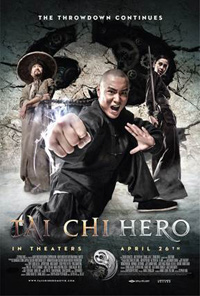Fallen Hero; Fung Spawns Unnecessary Sequel
 Bringing back the tonally strange style that makes these films so hard to classify, Stephen Fung’s follow-up to last year’s Tai Chi Zero displays little in terms of plot improvement. As with the first segment, the production value in Tai Chi Hero nothing short of a medium-size budget American action film, but excess mix-and-matches in cinematic techniques, genre elements, and Hollywood clichés create a bottom feeder item in the “flying” martial arts subgenre of the past decade or so.
Bringing back the tonally strange style that makes these films so hard to classify, Stephen Fung’s follow-up to last year’s Tai Chi Zero displays little in terms of plot improvement. As with the first segment, the production value in Tai Chi Hero nothing short of a medium-size budget American action film, but excess mix-and-matches in cinematic techniques, genre elements, and Hollywood clichés create a bottom feeder item in the “flying” martial arts subgenre of the past decade or so.
A sequel that cannot stand as film on its own, even as basic as the story is, it requires previous knowledge of what the cookie-cutter characters had been up to in the first chapter, Hero begins exactly where the last adventure left off, with an episodic TV series template, things move fast in the Tai Chi saga, therefore; for the sake of the audience, the film briefly recounts the most important events of Zero. Lu Chan (Yuan Xiaochao), the protagonist and ex member of the Chinese rebel group Divine Truth, possessed an incredible power that emanates from a strange horn-like protuberance on his head. His mother, who died when he was a child, commends him to learn kung fu; this passion only grows bigger as an elder master suggests he must learn the fighting techniques of the remote Chen Village.
Now, in the second part of the journey, Lu Chan has helped Chen village defeat a metallic “monster” brought by the British Indian Company with aims of building a railroad through the village. After developing a bittersweet relationship with the village master’s daughter Yu Niang (Angela Yeung Wing), he must now prove himself worthy of learning the secret kung fu style, while at the same time defending the villagers from a vengeful Western-friendly villain. An underdog trying to fulfill his destiny, a strong female character trying to find the right man, and a wise father protecting tradition in the face of modernization.
Using very didactic labeling all throughout the film, Fung makes it clear that he expects little focus from his audience. Such billboards explain which Chinese icon is playing which character, where numerous establishments are located within the village, and even the exact motivations of the characters. He leaves zero room for any subtle or nuanced performances; any possibility for an abstract interpretation of the story is instantly removed.
Surely Fung’s Tai Chi franchise (the open ending assures will certainly have a third part) isn’t meant to be taken seriously, or at least it shouldn’t. The director’s “everything-goes” approach for Tai Chi Hero is mind-boggling, even for a CGI Chinese pop corn flick. Animated sequences are as easily thrown at the audience as video game-inspired visual aesthetics that resemble those of Scott Pilgrim vs. the World. In fact, the characters here feel cartoonish, even satirical, which wouldn’t be a problem if that were the intent.


